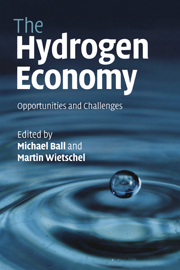Book contents
- Frontmatter
- Contents
- List of main contributors
- Preface
- Acknowledgements
- List of abbreviations
- 1 Scope of the book
- 2 Why hydrogen?
- 3 Non-renewable energy resources: fossil fuels – supply and future availability
- 4 Non-renewable energy resources: nuclear fuels
- 5 Assessment of the potentials for renewable energy sources
- 6 Carbon capture and storage
- 7 Energy-chain analysis of hydrogen and its competing alternative fuels for transport
- 8 Hydrogen today
- 9 Fundamental properties of hydrogen
- 10 Hydrogen production
- 11 Hydrogen storage
- 12 Hydrogen distribution
- 13 Key role of fuel cells
- 14 Hydrogen-infrastructure build-up in Europe
- 15 Building a hydrogen infrastructure in the USA
- 16 Hydrogen and the electricity sector
- 17 Hydrogen corridors
- 18 Macroeconomic impacts of hydrogen
- 19 Sustainable transport visions: the role of hydrogen and fuel-cell vehicle technologies
- 20 Energy-efficient solutions needed – paving the way for hydrogen
- 21 The future of hydrogen – opportunities and challenges
- Further reading
- Index
21 - The future of hydrogen – opportunities and challenges
Published online by Cambridge University Press: 22 January 2010
- Frontmatter
- Contents
- List of main contributors
- Preface
- Acknowledgements
- List of abbreviations
- 1 Scope of the book
- 2 Why hydrogen?
- 3 Non-renewable energy resources: fossil fuels – supply and future availability
- 4 Non-renewable energy resources: nuclear fuels
- 5 Assessment of the potentials for renewable energy sources
- 6 Carbon capture and storage
- 7 Energy-chain analysis of hydrogen and its competing alternative fuels for transport
- 8 Hydrogen today
- 9 Fundamental properties of hydrogen
- 10 Hydrogen production
- 11 Hydrogen storage
- 12 Hydrogen distribution
- 13 Key role of fuel cells
- 14 Hydrogen-infrastructure build-up in Europe
- 15 Building a hydrogen infrastructure in the USA
- 16 Hydrogen and the electricity sector
- 17 Hydrogen corridors
- 18 Macroeconomic impacts of hydrogen
- 19 Sustainable transport visions: the role of hydrogen and fuel-cell vehicle technologies
- 20 Energy-efficient solutions needed – paving the way for hydrogen
- 21 The future of hydrogen – opportunities and challenges
- Further reading
- Index
Summary
Context – the energy challenge of the future
Today's energy and transport systems, which are based mainly on fossil energy carriers, can in no way be evaluated as sustainable. Given the continued growth in the world's population as well as the progressive industrialisation of developing nations, particularly in Asia, but also in South America, the global demand for energy is expected to continue to escalate in the coming decades – by more than 50% until 2030, according to the International Energy Agency (IEA) – with fossil fuels continuing to dominate global energy use. At the same time, there is a growing global consensus that greenhouse-gas (GHG) emissions, which keep rising, need to be managed, to prevent dangerous anthropogenic interference with the climate system. Hence, security of supply and climate change represent two major concerns about the future of the energy sector, which give rise to the challenge of finding the best way to rein in emissions while also providing the energy required to sustain economies. Concerns over energy supply security and climate change, as well as local air pollution and the increasing prices of energy services, are having a growing impact on policy making throughout the world.
The transport sector today accounts for some 18% of primary energy use and some 17% of global CO2 emissions, with the vast majority of emissions coming from road transport. Transport is also responsible for 20% of the projected increase in both global energy demand and greenhouse-gas emissions until 2030.
- Type
- Chapter
- Information
- The Hydrogen EconomyOpportunities and Challenges, pp. 613 - 639Publisher: Cambridge University PressPrint publication year: 2009
- 7
- Cited by



